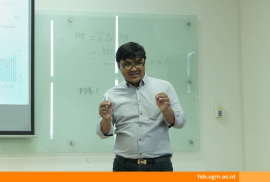Last Friday (19/02) a research presentation was successfully held through the Zoom platform titled as “Fiscal Behavior (Tax Apparatus or Tax Officials) in Tax Dispute Resolution: The Influence of Superior Pressure and Partner Objectives on Negotiation Outcomes and Fiscal Confidence” by Dr. Fauzan Misra Rahmat Kurniawan, S.E., M.Sc., Ak., CA., Lecturer in the Department of Accounting, Faculty of Economics, Andalas University.
Before the presentation began, the event started with an opening by Vogy Gautama Buanaputra, S.E., M.Sc., Ph.D., AFHEA., Lecturer at the Department of Accounting, Faculty of Economics and Business UGM, as the moderator who guided the presentation. Furthermore, Dr. Fauzan began the presentation of his research article by first describing the background of his research. The literature he found states that the rise of tax disputes can provide uncertainty and erode confidence in the tax system. Therefore, according to Dr. Fauzan, finding a resolution through negotiation can be the best alternative solution. Another thing behind the writing of research articles is the limited literature regarding the process and outcome of negotiations between tax authorities and tax agents and also limited research examining the behavior of the tax authorities in the negotiation process.
The focus of the problem from the research conducted by Dr. Fauzan is concerned about the tax auditors who are often faced with compliance pressures and various types of taxpayer characters in negotiating to resolve the assignment of tax dispute issues. This study aims to examine the influence of superior pressure and the objectives of negotiating partners in resolving tax issues disputes with taxpayers on the process and outcome of negotiations as well as confidence in the outcome of negotiations. The outcome of the negotiation that became the focus was the willingness of the tax authorities to mitigate the findings.
In this study, there are 5 hypotheses formulated by Dr. Fauzan. These hypotheses include hypothesis 1 which predicts the willingness of tax staff to ease the tax burden on their opponents of negotiation will be higher when the tax staff finds that their superior’s opinion is the same as their opinion and hypothesis 2 which predicts the effect of pressure in the context of differences in opinion or similar opinion between subordinates and superiors on the debated issue against self-confidence.
This research was conducted using an experimental method involving 60 participants consisting of 26 male participants and 34 female participants from the local tax staff. Participants involved have varying ages, average work experience, and educational levels. The results of the study found that pressure from superiors did not affect the negotiation outcome generated by tax staff, but this pressure affected staff confidence in the results of the negotiations delivered. “This can answer why tax officials who face stronger superior pressure have more confidence in their work output than tax officials who face weaker pressure.”, explained Dr. Fauzan.
In conclusion, the findings of this study imply the importance of knowing the objectives of the negotiating partner and the position of the supervisor regarding the negotiation proposals submitted by the parties. There are limitations in the form of negotiations that are not held simultaneously in this study. The research presentation ended with a question and answer session guided by the moderator. To listen to a complete and comprehensive explanation of the presentation of this research, please visit the Fakultas Ekonomika dan Bisnis UGM YouTube channel via the following link: https://youtu.be/I18jT8O-GkU
Reportase: Kirana Lalita Pristy/Sony Budiarso




